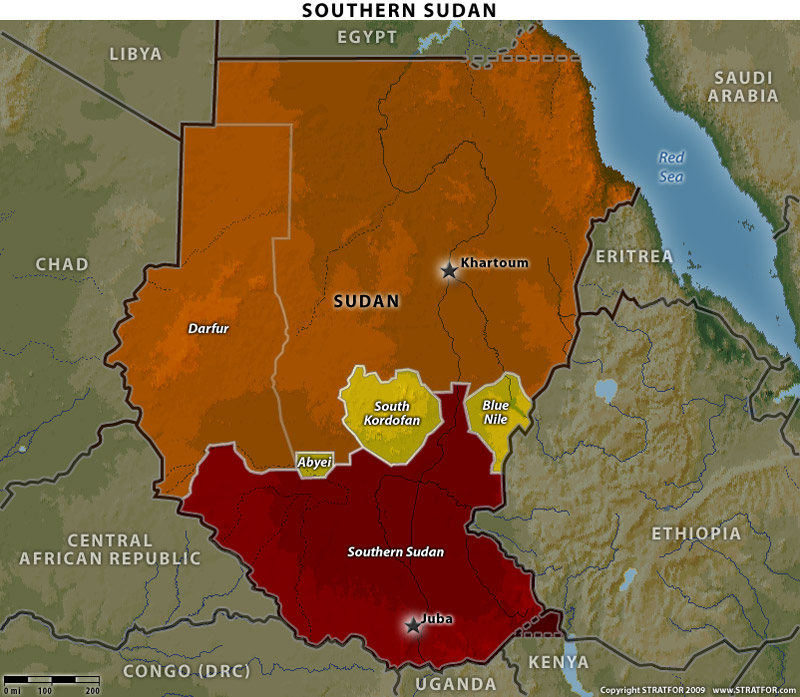 webmaster
webmaster
© Copyright DEHAI-Eritrea OnLine, 1993-2009
All rights reserved
From: Tsegai Emmanuel (emmanuelt40@gmail.com)
Date: Wed Dec 30 2009 - 08:29:42 EST
Sudan: An Agreement at Last?
Stratfor Today » <http://www.stratfor.com/analysis> December 29, 2009 |
2336 GMT
ASHRAF SHAZLY/AFP/Getty Images
Southern Sudanese leader Salva Kiir Mayardit on Sept. 30
Sudan’s parliament approved a law Dec. 29 governing the format of a
referendum on the issue of Southern Sudanese independence, scheduled to be
held in January 2011. With the passage of the bill, the Government of
National Unity – a coalition established in 2005 between the leading parties
of Sudan’s two main regions – has avoided a possible fracture. There still
remains more than a year to go before the holding of the referendum vote in
Southern Sudan, when residents of the semi-autonomous region will be able to
decide on whether or not to secede from Sudan.
The Dec. 29 law on the terms of the referendum was the second one passed in
a week by the Sudanese parliament, but the first that was supported by both
the Khartoum-based National Congress Party (NCP) and the Juba-based Sudan
People’s Liberation Movement (SPLM). SPLM members had walked out of
parliament in protest Dec. 22 when the NCP, which holds the majority in the
coalition government, forced through a bill that had been amended at the
last minute without consulting the SPLM. The amended bill, which would have
required southerners living in the north to cast their ballots in the north,
went against an earlier Dec. 13 agreement between the two parties, which
said that southerners living outside Southern Sudan must return to their
home region to vote.
The law agreed upon Dec. 29 removes the restrictions placed on southerners
who reside in the north, giving them the choice of being able to cast their
ballots in the south if they so choose. This has allayed SPLM fears that
Khartoum could tamper with the votes of the sizable Southern Sudanese
population north of the line of demarcation by restricting their access to
southern polling stations.
<http://web.stratfor.com/images/africa/map/Sudan_southern_800_2.jpg>
Another sticking point with Southern Sudan was an attempt by the NCP to
insert a clause in the law that would allow any Sudanese citizen, in any
part of the country, to claim ancestral links to Southern Sudan and thus
cast a ballot from his home region. Sudanese history is one that has
featured extensive mixing of blood and cultures, thereby making it possible
for nearly anyone to claim Southern Sudanese roots despite having no actual
connection to the region. The Dec. 29 agreement stipulates that any citizen
of the north who wishes to cast a vote in the referendum must have his
claims to being a southerner “certified” by the local leader of his home
village. This will help Southern Sudan prevent Khartoum from sabotaging a
vote that must see a 60 percent turnout of registered Southern Sudanese
voters to be considered valid, with a majority voting for secession to lead
to southern independence.
Southern Sudan’s estimated 8 million residents are heavily outnumbered in
comparison to the north’s 31 million. In addition, polling stations in
Khartoum could be vulnerable to acts of voter fraud in the absence of SPLM
oversight. Thus, the SPLM could not accept the terms of the Dec. 22 bill
passed by the NCP-dominated parliament. A referendum held under such
conditions would almost have guaranteed a majority of votes against
secession.
Although the Janurary 2011 referendum law has been agreed upon by both the
NCP and SPLM, there remain other contentious issues that have yet to be
resolved since the formation of the U.S.-brokered Comprehensive Peace
Agreement that ended the 22-year Sudanese civil war. Included in these is a
referendum, also scheduled to be held in 2011, to determine to which side
the oil-rich province of Abyei will belong, as well as the issue of
demarcating the borders between north and south in the provinces of South
Kordofan and Blue Nile.
While Southern Sudan could end up voting in favor of secession, Khartoum
maintains a de facto veto in the use of military force to keep Southern
Sudan (and, more importantly, oil-rich regions such as
Abyei<http://www.stratfor.com/analysis/sudan_khartoum_fights_survival>)
locked into union with the north.

 webmaster
webmaster